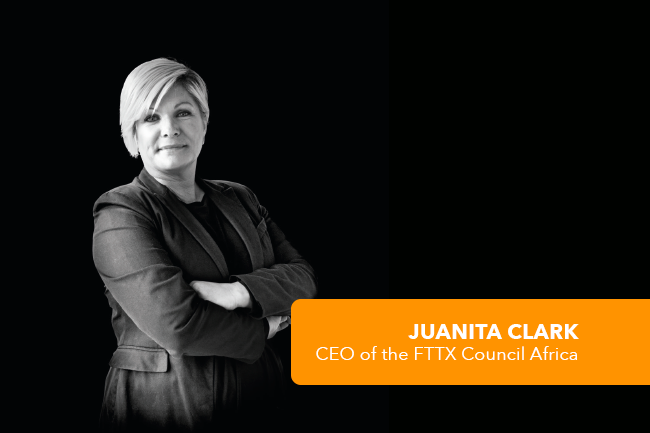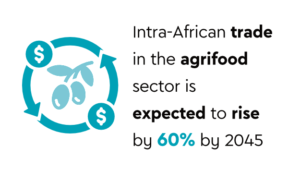As Industry 4.0 rapidly gains momentum, it is accompanied by an increasing need to ensure enough fibre-optic infrastructure exists in Africa, given that it is the foundation for establishing the next generation of broadband services. Indeed, it plays a pivotal role in every technology, both traditional and emerging.
‘It’s a critical conversation because it touches on so many organisations and lives,’ says Juanita Clark, CEO of the FTTX Council Africa, an industry association that works to educate African governments, policy-makers and political leaders about high-speed fibre connectivity, and provides practical solutions for, among others, policy, regulation, best practice and minimum standards.
‘We’re talking corporates that need fibre to move data seamlessly between multiple clouds; smart cities for which fibre is the heartbeat; and for the protection of consumers through centralised control of CCTV, which is improving community policing,’ says Clark. ‘The list is endless.’
Surprisingly, the continent’s fibre industry is only 10 years old, as is the FTTX Council. It has its roots in South Africa where Clark and her team undertook, and continue to undertake, extensive research to understand the concerns of major industries, and how fibre would and does affect their sustainability, as well as how it can be delivered in coming years. ‘Our work involves creating awareness and ongoing communication between all stakeholders, which includes consumer education,’ she says. ‘Loops have to be closed between government and its economic participants to ensure there is a firm understanding of what is happening in the “trenches”.’
It sometimes seems an impossible task, says Clark, but progress has been rewarding given that by end-June this year, 1 498 411 ‘homes’ had been passed (homes being the end points of connections), with 610 935 connections in South Africa, which remains the leading African country in terms of fibre penetration (with East African nations close on its heels). ‘Kenya, Rwanda and Uganda have deployed substantial amounts of fibre, and in West Africa, Ghana is steadily progressing. Nigeria is gradually deploying fibre infrastructure, but slower than demand warrants,’ according to Clark.
Fibre has become increasingly popular, with 5G set to enter the market in 2020. 5G promises much faster data transfer speeds at 10 Gbps than 4G’s 1 Gbps. It is heavily dependent on fibre because of the densification requirements of cells that provide the connectivity speeds. ‘The only feasible backhaul technology that can do this is fibre. The needs of the next stage of mobility define 5G with the promise of gigabit speeds to each mobile user, sub-1 millisecond latency, connecting 1 million devices per square kilometre,’ says Clark.
‘In comparison to where we are today, 5G will enable exponentially higher peak data rates and will require a massive increase in the number of fibre-fed cell sites. 5G is a prerequisite for widespread deployment of other technologies too, inclusive of autonomous vehicles, drone networks and augmented virtual reality, which bring enormous societal benefits.’
For example, 5G will enable remote robotic surgery and the wider adoption of the autonomous car, and crop and livestock management will improve. It’s not quite the silver bullet for solving Africa’s problems, says Clark, but it will enable transformation and set the scene for solutions ‘by Africans for Africans’ to be developed.
Ironically, it is the poorest people who have the most to gain by being connected. Connecting rural communities actually slows down urbanisation because underserved communities can be given access to education and health services without needing to travel to larger cities to access those facilities. For the younger generation, connectivity stands for social inclusion in general, vital in breaking down societal barriers.
‘But connectivity does set the stage for large-scale disruption,’ says Clark. ‘Never more true is the saying “disrupt or be disrupted”. New technology won’t only impact businesses – and this must be a clear warning – but individuals too. If you are not keeping up to date with changes in the environment you will be left behind. ‘The future belongs to those that stay current in the digital space.’
This is equally true for African nations that need to drive their economies. Those that take an innovation lead will be countries that have heavily invested in fibre infrastructure, because they will be able to leverage the benefits of high-speed broadband. ‘To support these growth requirements, the continent’s leaders need a massive overhaul of thought leadership,’ says Clark.
‘In South Africa, for example, we can for the first time in a long time see that the political will and passion exists to tap into the potential of the Fourth Industrial Revolution. This is also true for other African nations, and you can gauge the future leading economies by their broad-band strategies.
‘We are finally on the right course, with policy direction and desperately needed regulation on the horizon,’ she says. ‘However, with progress comes responsibility. We still have a lot of work to do.’

















